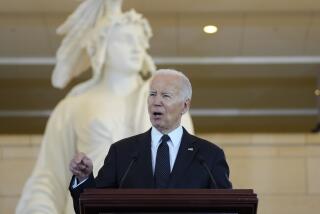House OKs Bill Imposing Sanctions for Religious Persecution
- Share via
WASHINGTON — Over strong opposition from the Clinton administration and big business, the House overwhelmingly approved legislation Thursday requiring Washington to impose economic sanctions against countries, including allies, that practice religious persecution.
The bill is an unprecedented move by Congress to project one of America’s founding ideals, religious freedom, into foreign policy. A similar bill enjoys broad support in the Senate and less opposition in the White House because it would give the president some flexibility to temper the punishment to fit the severity of the offense.
The House measure was written by Rep. Frank R. Wolfe (R-Va.), who has made a crusade of combating religious persecution around the world. It passed, 375 to 41.
The vote was hailed by former Chinese dissident Wei Jingsheng, who called it “a blow . . . to oppression and a vote for freedom.”
While the bill’s opponents professed abhorrence toward religious persecution, many explained their opposition to the legislation by expressing concern that the bill actually could increase such discrimination by causing a backlash against minorities.
Rep. Lee H. Hamilton (D-Ind.) added that the measure would create “a damaging hierarchy of human rights violations” that elevates religious persecution above racial discrimination, press censorship or ethnic cleansing.
That concern was also expressed at a Senate Foreign Relations Committee hearing earlier this week by John Shattuck, assistant secretary of State for democracy, human rights and labor. He said that such a ranking would be “a tragic mistake.”
Wolfe’s bill would create in the State Department an office of religious persecution monitoring, whose presidentially appointed director would make recommendations to the secretary of State and submit an annual report to Congress.
If religious persecution is reported, the bill requires the United States to cut off all non-humanitarian assistance and oppose loans by international financial institutions to the targeted country.
The president could waive sanctions in cases of national security or when he determines that the bill’s “objectives” of fighting religious persecution would actually be better served without the punishment.
Still, Shattuck and other critics said that a president needs greater flexibility. Many in the business community have formed a coalition called “USA Engage” to fight the bill.
On Wednesday, the White House said Clinton’s advisors would recommend that he veto the Wolfe bill.
More to Read
Get the L.A. Times Politics newsletter
Deeply reported insights into legislation, politics and policy from Sacramento, Washington and beyond. In your inbox twice per week.
You may occasionally receive promotional content from the Los Angeles Times.










